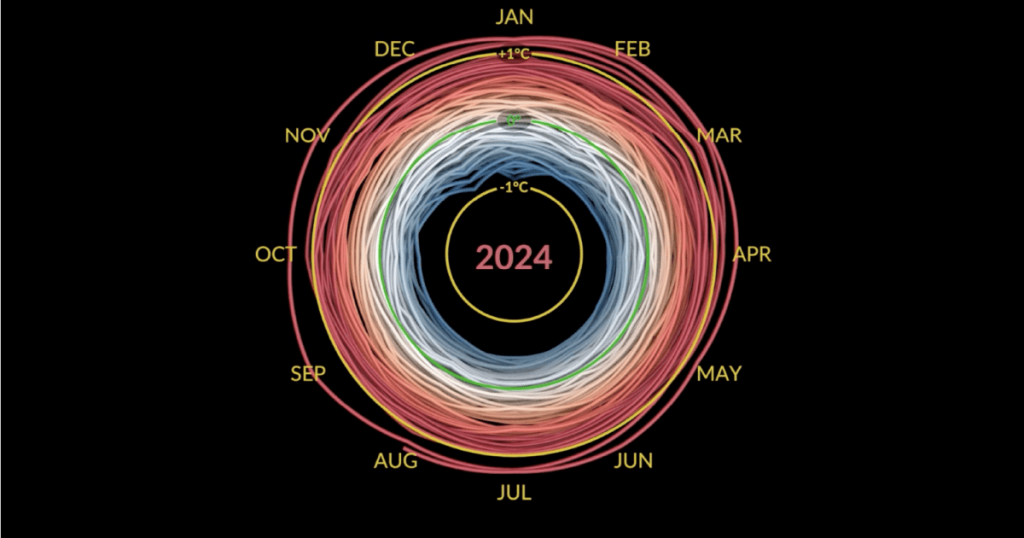2024 has etched its name in history as the hottest year on record, a stark testament to the escalating climate crisis. Surpassing the previous record held by 2023, this year witnessed global average temperatures breach the critical 1.5°C threshold above pre-industrial levels, a limit set by the Paris Agreement to avert the most catastrophic consequences of climate change. While this breach doesn’t signify a failure of the agreement itself, it serves as a resounding alarm, underscoring the urgent need for intensified global climate action. The rising temperatures have unleashed a cascade of extreme weather events worldwide, from devastating floods in Nigeria and Europe to ferocious wildfires in South America, and from early heatwaves to catastrophic hurricanes in the United States. This year’s climate record serves as a stark reminder of the interconnectedness of our planet and the far-reaching consequences of unchecked greenhouse gas emissions.
The year 2024 began with record-breaking warmth. January registered the highest global average surface air temperature ever recorded for that month, surpassing the previous record set in 2020. This marked the beginning of an eight-month streak of record-breaking monthly temperatures, extending from June 2023 to January 2024. This unprecedented warmth continued into February, culminating in the warmest Northern Hemisphere winter on record. Simultaneously, ocean temperatures soared to unprecedented heights, exceeding the previous record set in August 2023. This alarming trend highlights the pervasive impact of rising greenhouse gas emissions, with effects felt far beyond the immediate influence of cyclical climate patterns like El Niño.
While the El Niño climate pattern, characterized by unusually warm waters in the eastern Pacific, contributed to the elevated ocean temperatures, its influence alone cannot explain the full extent of the warming. The fact that record-high sea surface temperatures were observed in regions far removed from El Niño’s core, such as the tropical Atlantic and Indian Ocean, underscores the significant role played by anthropogenic greenhouse gas emissions in driving global warming. This pervasive warming has far-reaching consequences, impacting weather patterns and increasing the intensity and frequency of extreme weather events across the globe.
The warming oceans act as a potent engine for extreme weather, accelerating evaporation and transferring vast amounts of heat into the atmosphere. Storms traversing these warmer waters absorb more moisture and energy, resulting in intensified winds, heavier rainfall, and greater flooding upon landfall. This phenomenon was vividly illustrated during the 2024 Atlantic hurricane season. The season began with the exceptionally early formation of Hurricane Beryl, the first hurricane of the season and the earliest Category 5 hurricane ever recorded in the Atlantic. Beryl’s rapid intensification, surging from a relatively minor storm to a Category 4 hurricane within a single day, showcased the amplified power of storms fueled by warmer ocean temperatures.
Hurricane Beryl’s rapid intensification and attainment of Category 5 status, with winds exceeding 157 mph (252 km/h), underscores the devastating potential of hurricanes amplified by climate change. The storm’s early arrival and extreme intensity serve as a stark reminder of the increasing risks posed by hurricanes in a warming world. This trend of more intense hurricanes forming earlier in the season is consistent with the predictions of climate scientists regarding the impact of rising sea surface temperatures on hurricane development and intensity. The increasing frequency and intensity of extreme weather events such as Hurricane Beryl necessitate proactive measures to mitigate risks and enhance community resilience in vulnerable coastal areas.
The unprecedented heat of 2024, coupled with the extreme weather events it unleashed, paints a sobering picture of a planet grappling with the accelerating consequences of climate change. The year serves as a stark reminder that the 1.5°C threshold is not merely a number, but a critical boundary beyond which the risks of irreversible climate impacts escalate dramatically. The record-breaking temperatures, the warming oceans, and the intensification of extreme weather events underscore the urgent need for global cooperation and accelerated efforts to reduce greenhouse gas emissions. The future of our planet hinges on our collective ability to heed the warnings of 2024 and take decisive action to mitigate the escalating climate crisis.

